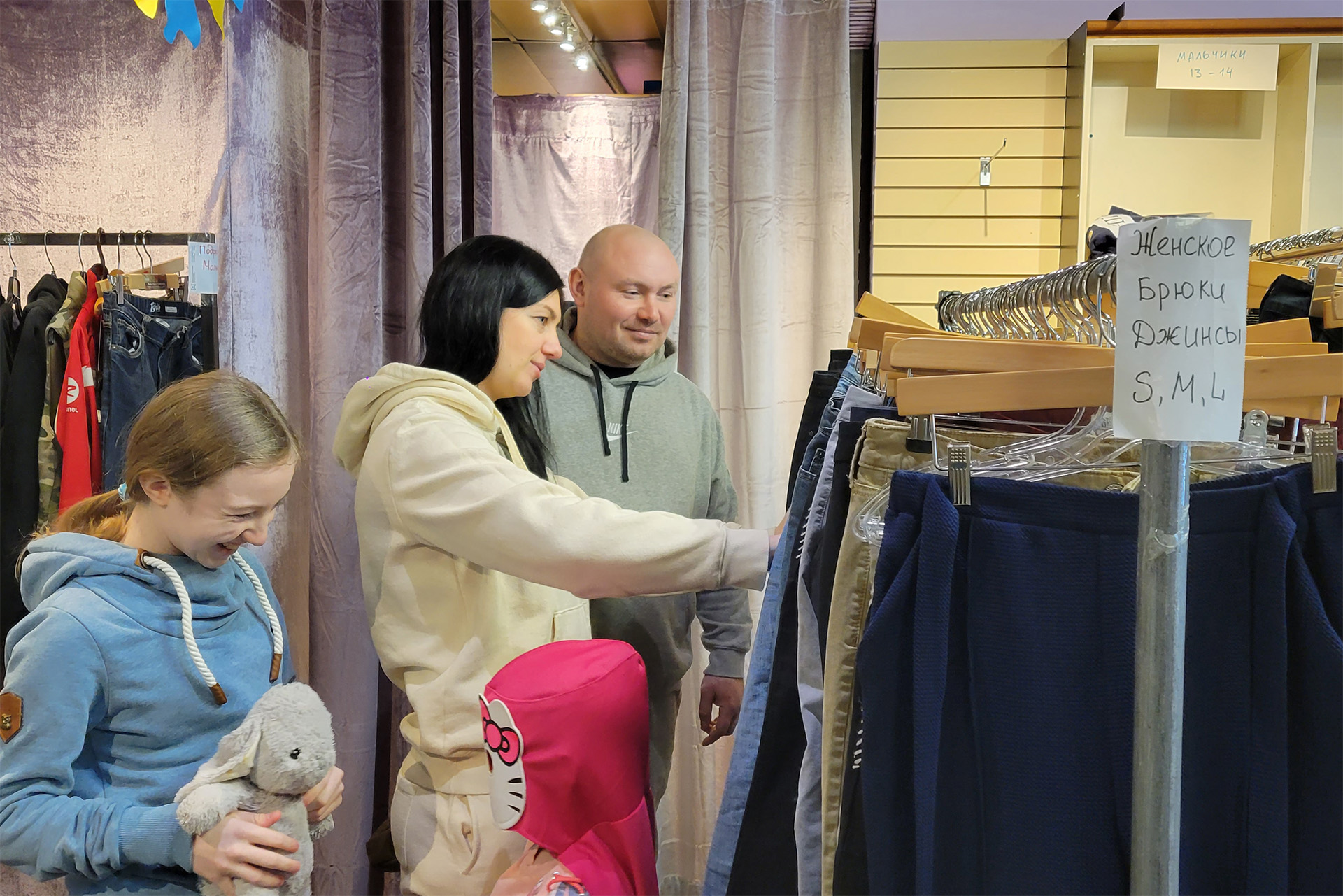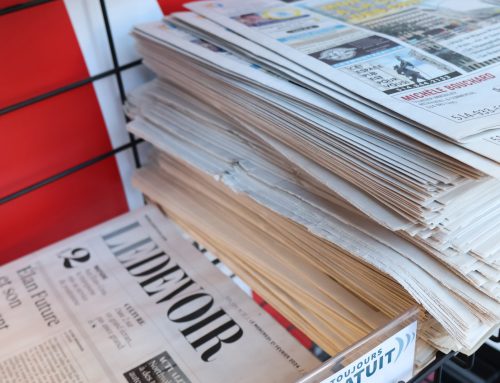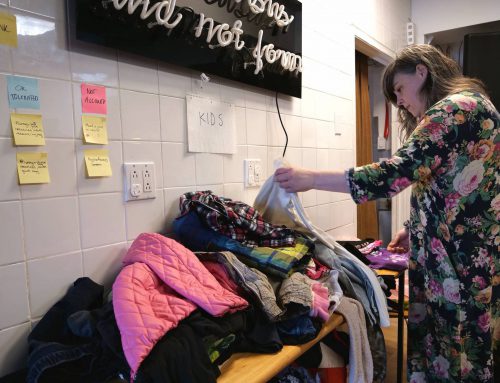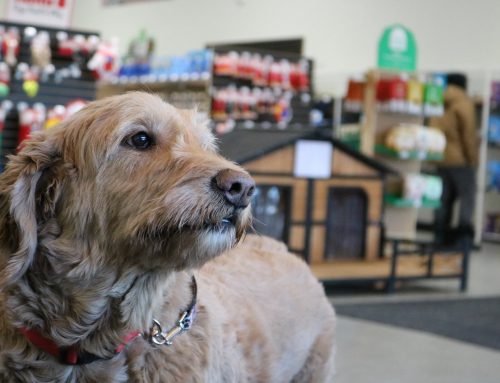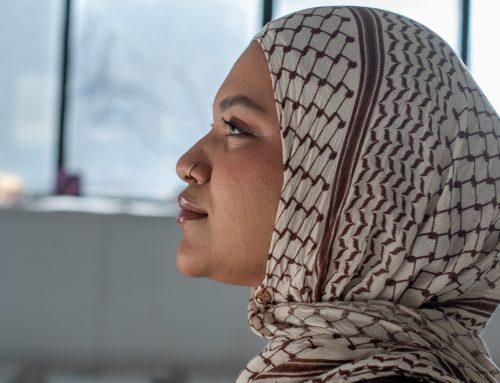BY Bogdan Lytvynenko & Nicoletta Alexakis
At five in the morning, Olena Martynova woke up to loud explosions in her hometown of Kharkiv, Ukraine. What first appeared as fireworks to her husband Artur and her daughters Miia and Yeva, aged five and 11, turned out to be everyone’s worst nightmare: a full-scale Russian invasion on Feb. 24, 2022.
“When Russian fighter jets started flying above us and dropping bombs, all I could see was an orange sky from the blast,” says Martynova. “Our apartment faced a major road leading straight to the Russian border — I was scared beyond belief and didn’t know which way to drive.”
The family of four passed through Poland, Germany, and France before finally landing in Montreal on Dec. 2 under the Canada-Ukraine authorization for emergency travel (CUAET) program.
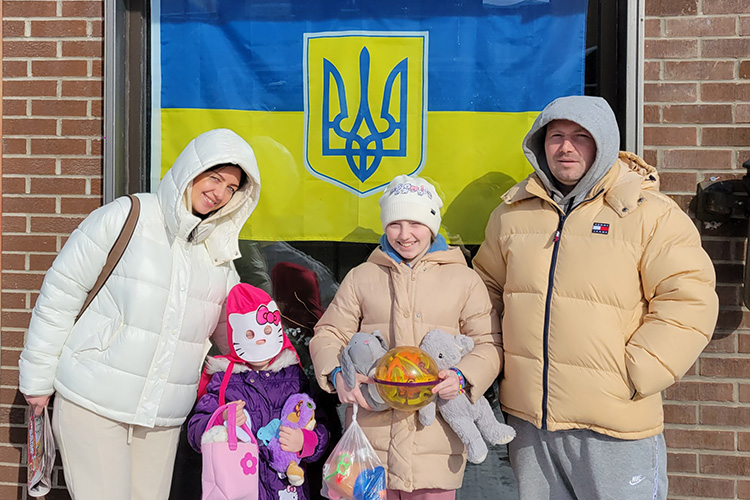
The Martynov family smiles in front of the Ukrainian flag and coat of arms in Côte-des-Neiges, Montreal. Photo by Bogdan Lytvynenko.
A group of volunteers from the Centre social d’aide aux immigrants (CSAI) greeted Martynova’s family and then arranged temporary housing at the Hilton Garden Inn hotel on Décarie Boulevard.
“I was honestly shocked by the conditions we got a chance to live in, especially my kids. We were given breakfast every morning, and the Red Cross even gave us $220 for groceries every week,” she says. “No one forced us out until we found our first apartment in January, in Saint-Michel. We are extremely grateful for that.”
Moreover, the family was impressed by the support provided at La Terrasse Ukrainian Newcomers Centre in Côte-des-Neiges, which serves as a major donation hub for Ukrainian refugees.
Igor Ezril, owner of Hotel Terrasse Royale, founded the centre last April on the first floor of his hotel with Olga Sakhnina, a fellow Ukrainian he met when the war began.
“First, I wanted to send some things to Ukraine, but then I decided to open a centre here to be fully certain that clothes and other donations are being used for a good cause,” he says.
According to Ezril, Montrealers have been very supportive of Ukrainian newcomers by helping to collect large quantities of winter jackets, jeans, shoes, pillows, blankets, and shelves full of children’s toys.
But the number-one need for newcomers, he says, is learning local languages and getting rid of the linguistic barrier.
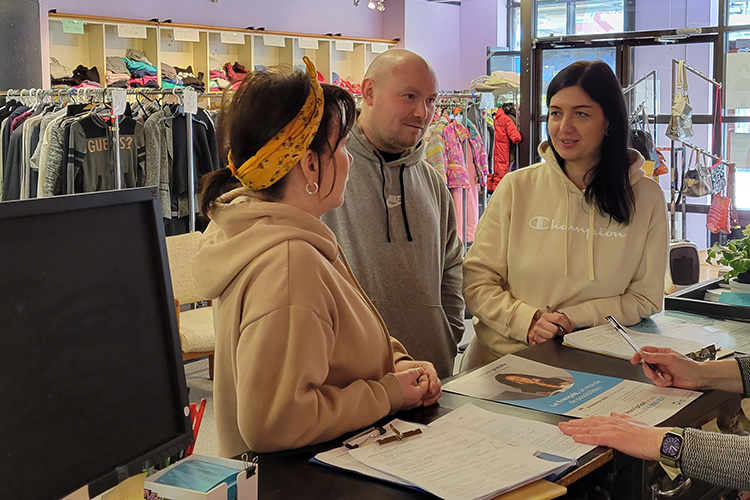
Olga Sakhnina (left) informs Olena and Artur Martynov of the mandatory paperwork for tax returns at the Ukrainian Newcomers Centre in Montreal. Photo by Bogdan Lytvynenko.
About 20 Ukrainian and Russian-speaking volunteers are at the hotel to help with finding housing and work, filling out immigration documents, and making medical appointments.
They also offer English and French classes on-site for all ages, as well as IT courses for children. Meanwhile, seniors over the age of 65 have their own space at the centre to play board games and socialize amongst each other.
“Our volunteers have been working here for 10 months, driven solely by initiative,” says Ezril. “We are very pleased that we’ve created such a close community here.”
Besides helping refugees in the city, Montrealers create initiatives to send humanitarian aid to Ukraine and help those fighting on the frontlines. Video by Nicoletta Alexakis.
Besides helping refugees in the city, Montrealers create initiatives to send humanitarian aid to Ukraine and help those fighting on the frontlines. Video by Nicoletta Alexakis.
In the meantime, Ezril and Sakhnina are hoping to receive financial aid from the Quebec government as they cover all expenses tied to maintaining the centre and keeping its doors open.
“There are not enough resources […] and it would’ve been easier with some form of government support,” says Ezril. “But the plan is to keep the centre open for as long as there is enough demand for it.”
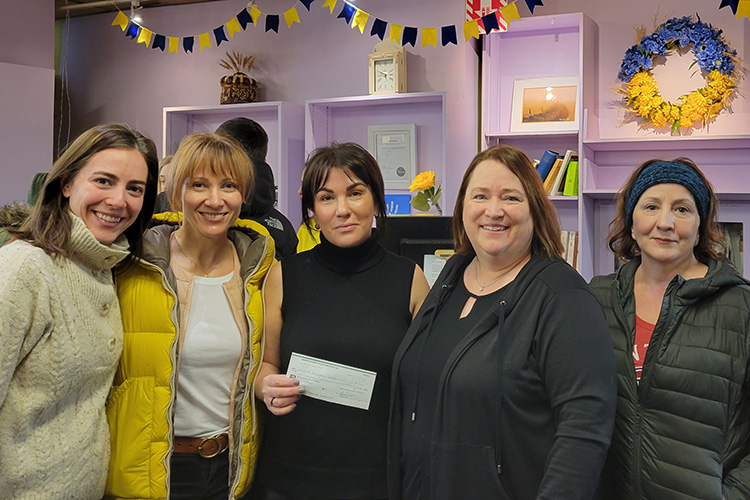
Olga Sakhnina (centre) receives a cheque for $5,000 from the American Women’s Club of Montreal in support of the donations hub on Feb. 11, 2023. Photo by Bogdan Lytvynenko.
From the government side, Ukrainian refugees can benefit from its Accompagnement Québec program, which is meant to facilitate the integration of immigrants into Quebec society.
“Integration assistance officers assess the immediate and future needs of newcomers and prepare an individualized action plan with them,” says Arianne Méthot, a spokesperson for the Quebec Ministry of Immigration, Francisation, and Integration.
This includes settling in Quebec, discovering the Quebec society, learning French, having one’s professional skills recognized in the province, integrating into the labour market, and finding out about immigration procedures.
“From April 1 to Oct. 9, 2022, 163 Ukrainian nationals were accompanied by integration assistance agents as part of the Accompagnement Québec service,” she says.
Other measures that have been put in place for Ukrainians wishing to settle in Quebec include pre-school, primary and secondary education, full coverage of the Quebec health insurance plan, a tax credit for childcare expenses, and temporary emergency accommodation.
According to Méthot, nearly 6,800 Ukrainians were welcomed at the CSAI kiosk inside the Montreal-Trudeau Airport between April 1, 2022 and Jan. 30, 2023, including Martynova’s family. That is where all newcomers can learn about Accompagnement Québec’s services.
The map shows the distribution of Ukrainian refugees by country (per 10,000 inhabitants) since the Russian invasion started on Feb. 24, 2022. Map by Bogdan Lytvynenko.
Moreover, the federal government provides non-taxable financial assistance to those migrating under the CUAET program. Upon arrival, every adult is eligible for a one-time payment of $3,000, with an additional $1,500 for each child.
“This not only helped us cover our basic needs, but now we can also afford our first car in Canada — which was much needed for running errands, considering how spread out everything is over here,” says Martynova.
Besides monetary assistance, however, many Ukrainian refugees are also in need of emotional and psychological support to heal and overcome their war experiences.
Starting in November 2022, those services have been available at the Quebec branch of the Ukrainian National Federation (UNF) in Montreal’s Outremont borough as part of the Ukrainian Wellness Program.
Dasha Sandra, a recent Master of Neuroscience at McGill University, is co-leading this program with Darya Naumova, a McGill psychiatry resident and vice-president of the UNF in Quebec.
“When I heard about my cousin’s experience of living with air-raid sirens in Kyiv, I realized there would be a huge need for this in the coming months,” says Sandra. “There was nothing in Montreal [specifically for Ukrainians] in terms of initiatives, so I wanted to change that.”
The program offers dance therapy sessions on weekends, where newcomers can release the stress through movement accompanied by relaxing tunes. Dancers are encouraged to eliminate their negative thoughts and traumatic experiences by using symbolic props and visualizing how they achieve their own aspirations.
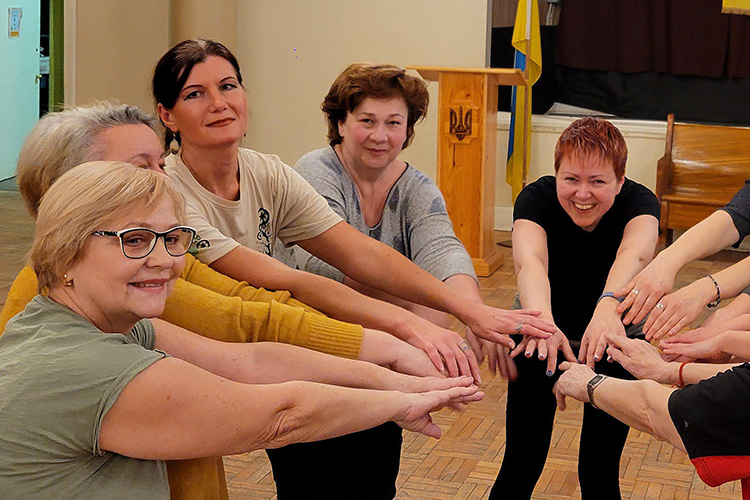
Dance therapist Dr. Tetiana Lazuk (right) provides movement therapy for refugees at the UNF in Outremont, Montreal. Photo by Bogdan Lytvynenko.
Individual psychological support and art therapy sessions for children are also provided free of charge, with the UNF and Joyce Foundations funding the initiative.
“Recent newcomers are dealing with the stress of adjusting to their new life and having to start all over again, including adaptation and dealing with the pressure of leaving loved ones back in Ukraine,” Sandra explains.
Another major psychological challenge is accepting the fact that the war will not end anytime soon, she added. And for some, the war’s impact has been so strong that they still live by the schedule of bombings and air-raid sirens in Ukraine, waking up around the same time to “escape the bombs.”
I must say the stoicism and resilience I’ve seen among Ukrainians has been awe-inspiring. The way people are dealing with difficulties — they manage it, handle it, and keep going.
Nevertheless, Ukrainian newcomers have made significant progress on many levels, according to Sandra. Besides becoming more open to psychological treatment, many have also found a sense of community where they belong and can discuss their hardships without feeling judged.
“I must say the stoicism and resilience I’ve seen among Ukrainians has been awe-inspiring,” says Sandra. “The way people are dealing with difficulties — they manage it, handle it, and keep going. It’s truly inspiring.”
In fact, Martynova has already accepted that the war will last for a long time. As Kharkiv lies just 40 kilometres from the Russian border, she currently has no plans to return home.
“We are definitely staying here in Canada,” she says.
Martynova’s husband has already found a full-time job as a mechanic, and her older daughter is almost ready to study in an English school. Meanwhile, Martynova herself is actively learning French to comfortably settle in Montreal in the near future.
And while safety was the main reason for Martynova’s family to stay, the support it received from the Montreal community also played a major role in making the decision.
“There is so much warmth from the Canadian people,” she says. “From personal experience, I’d say there’s even more support here than in Europe, it’s coming from all sides — it’s overwhelming.”
“We are incredibly grateful for all the help we received to find a home away from home, and to give our daughters a promising future they deserve.”
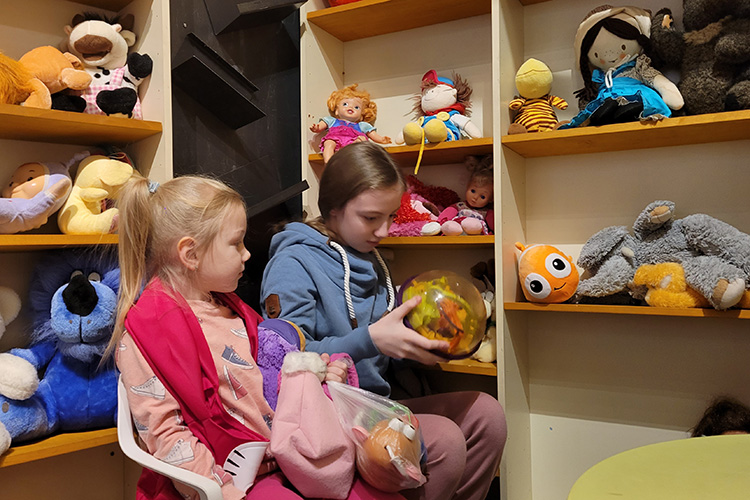
Miia (left) and Yeva Martynova play with newly donated toys at the Ukrainian Newcomers Centre. Photo by Bogdan Lytvynenko.
